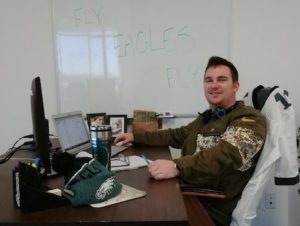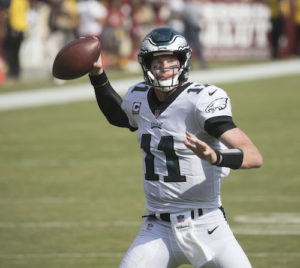Fly, Eagles Fly: Sales Lessons from the Super Bowl
On Sunday, the Philadelphia Eagles face off in the Super Bowl against the New England Patriots. It wasn’t easy getting there, but as a sales rep, I felt all-too familiar feelings this season.
In December, Quarterback Carson Wentz tore his ACL and was declared out for the season, forcing Coach Doug Pederson and the Eagles to make a huge change before the playoffs. Although it was difficult, the Eagles continued their run, and finally have another chance to win their first (yes, I said it, first) Super Bowl!
In sales, you can spend weeks, even months working on a deal, only to have it all fall through at the last minute. Or, you can spend all quarter emailing, calling, and demoing leads, but find no traction and end up scrambling to hit your numbers.
There’s many parallels between the Eagles’ season and life as a rep. Doug Pederson sets an example for sales coaches and managers everywhere when it comes to overcoming adversity and adjusting to change. If you ask any Eagles fan (like myself) we’ll tell you we knew we would be in the Superbowl way back in June, and never had a doubt (well, maybe one here and there) that this would be our year.
The Eagles Never Gave Up
Carson Wentz was quickly on his way to being named MVP before he went down. Foles, on the other hand, had delivered decent performances at best.
Doug Pederson didn’t let the Eagles’ fate be defined by the injury of Carson Wentz. Pederson completely changed the strategy and kept moving forward. Thanks to Pederson’s revisions, the Eagles offense maintained their average 390 yards per game with Foles. But when you look at the data, they were accomplished in a completely different way.
With Wentz, Philadelphia relied on the Quarterback for yardage and didn’t ask the recievers to do much after catching a pass. Wentz averaged 7.7 per pass, with receivers traveling an additional 4.8 yards on average after the reception, accounting for 12.4 yards total. Foles does not have the same passing ability as Wentz, which Pederson expertly accounted for. Now, Foles averages 5.5 years in the air, with receivers working for an extra 6.7 on foot after the catch. That adds up to a total of 12.2 yards per completion.
With a completely different strategy, Pederson accomplished the same results. The Eagles embraced this change and maintained their hunger for a Super Bowl win.
Sales Shouldn’t Either
The way Pederson and the Eagles adjusted after a setback and reached a goal serves as an example for sales coaches and reps. Like the Eagles’ season, selling is non-stop objections and a rush to hit the right numbers. Sometimes, the way reps are expected to do things just don’t work for them. Pederson showed us that it’s how we react that really matters. Pederson didn’t keep his offense the same and expect Foles to hit passes that he couldn’t. He changed his team’s strategy and adjusted the process to match the circumstances, which resulted in the same (if not better) performance. 
Sales coaches can do the same thing. I can’t name a single person in sales who hasn’t dealt with a brutal rejection, stressed about hitting a goal, or had trouble finding the path to success. Sales coaches need to remind their reps that paths aren’t always clear, and keep them motivated and moving forward, regardless of the situation.
Sales Coaches can work with reps to utilize their skills in a manner that leads to the desired outcome. If a rep struggles to capture sales via email, but is great on the phone, enable them to spend more time calling. If someone can’t close large enterprise deals but is great with smaller businesses, allow them to hit their goals by closing a large volume of small deals. Most importantly, stay positive. If the Eagles had given in to the loss of Wentz, they likely wouldn’t be facing the Patriots this Sunday.
Speaking of fighting through adversity… being the only Eagles fan in an office full of Patriots fans, including our CEO, Howard Brown, has made this week interesting!
That said, Fly Eagles Fly! Good luck this weekend and beat the Patriots!

